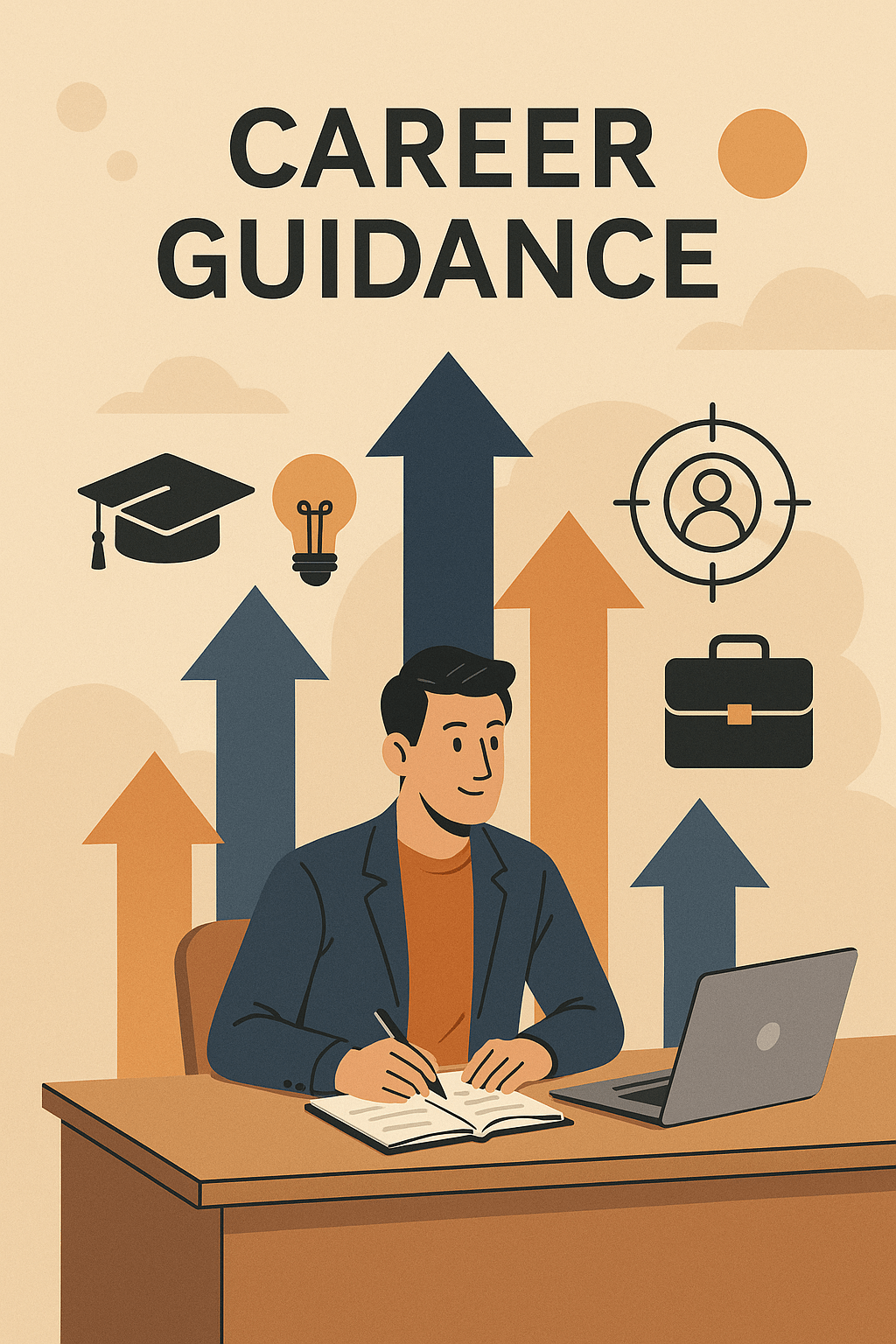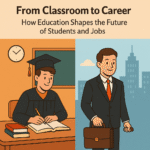Choosing a career is one of the most important decisions in life. It affects your identity, lifestyle, financial security, and long-term satisfaction. However, the process of identifying what career suits you isn’t always straightforward. Many people face uncertainty, especially in a world where job markets shift quickly, industries evolve, and new skills are constantly in demand.
Career guidance helps individuals make informed decisions about their professional journey. It offers clarity, direction, and support, especially when choices feel overwhelming or when people are unsure about their potential or goals.
This article provides an in-depth view of what career guidance means, why it matters, how to approach it, and practical steps anyone can take at different stages of life, from school to mid-career transitions.
What Is Career Guidance?
Career guidance is the process of helping individuals understand themselves and the world of work to make smart educational, training, and career decisions. It includes identifying strengths, interests, values, and goals and matching them with potential career options.
Professionals who offer career guidance—such as counsellors, mentors, or industry experts—help individuals analyse various job paths, prepare for qualifications, and plan a roadmap to move ahead with clarity and confidence.
Key Takeaway
Career guidance supports people in identifying careers aligned with their skills and goals. It combines self-assessment and industry insight to help individuals move forward with purpose, whether starting out or considering a shift.
Read more:- Banking Career Guide
Why Career Guidance Matters More Than Ever
In the past, many people followed predictable career paths: education, job, and retirement. But today, the average person changes jobs multiple times and may switch industries entirely. This constant change means that relying on instinct or peer pressure alone is not enough.
Young adults, especially, face pressure from family or society to choose traditional professions, often without knowing what those jobs truly involve. At the same time, industries such as AI, renewable energy, digital marketing, and data science are opening new doors that few even considered a decade ago.
Career guidance helps make sense of these changes by offering up-to-date knowledge and matching it with individual abilities and preferences.
Key Takeaway
With the job market evolving quickly, guessing or copying others no longer works. Career guidance offers the support needed to match personal strengths with new opportunities, leading to better decisions and long-term satisfaction.
When to Seek Career Guidance
Career guidance is helpful at multiple points in life:
-
After Class 10 or 12 – When choosing streams like science, commerce, or humanities.
-
During Graduation – While considering specialisations, internships, or postgraduate studies.
-
Early Career Stage – To choose between roles, organisations, or further studies.
-
Mid-Career – For those seeking a shift due to job dissatisfaction or burnout.
-
Returning to Work – After a career break due to family, health, or relocation.
-
Entrepreneurial Paths – When deciding between employment and starting a business.
At each stage, a different set of questions arise, and career guidance helps find answers through structured support and practical planning.
Key Takeaway
Career guidance isn’t limited to school students. Whether it’s a first job, a shift in direction, or a return after a break, timely advice can save years of uncertainty and help set achievable goals.
Steps in the Career Guidance Process
Here’s how a structured career guidance journey typically looks:
1. Self-Assessment
This step focuses on identifying interests, values, personality type, and skills. Tools like aptitude tests, interest inventories, and personality assessments are used to help individuals understand their natural inclinations.
2. Career Exploration
Once self-assessment is done, the next step is to look at careers that align with the person’s profile. This includes understanding what the job entails, required qualifications, salary range, work environment, and growth scope.
3. Goal Setting
Career guidance professionals help set short-term and long-term goals, along with realistic timelines. These could be finishing a course, getting an internship, or applying to a specific industry.
4. Planning Education or Skill Development
Based on the chosen path, individuals may need to pursue a degree, certification, or training program. Guidance helps narrow down the best-fit options based on budget, geography, and future scope.
5. Job Search Strategy
For those ready to enter the workforce, career counsellors also guide resume writing, interview preparation, and networking techniques that increase chances of success.
6. Decision Making and Review
The process doesn’t stop with a decision. Career planning is ongoing. Individuals are encouraged to review their choices periodically and make adjustments as required.
Key Takeaway
A proper career guidance process moves from self-understanding to real-world action. It breaks down confusion into manageable steps that include testing, exploring, planning, and reviewing, helping people make steady progress.
Read more:- PCM Career Options
Common Myths Around Career Guidance
Despite its importance, many still hesitate to seek help. Some common myths include:
-
“It’s only for students.”
In reality, people of all ages benefit from career guidance, especially during transitions. -
“My parents or teachers know best.”
While well-meaning, they may not have insights into emerging fields or job market trends. -
“I’ll figure it out later.”
Delaying career decisions can lead to wasted years and missed opportunities. -
“Career tests will give me an exact answer.”
Tests are tools, not decisions. Guidance involves discussion, reflection, and planning beyond test results.
Key Takeaway
Career guidance is often misunderstood. It’s not about choosing a job for you—it’s about giving you tools, insight, and support to make better decisions on your own, at any life stage.
Who Provides Career Guidance?
Career guidance can come from a variety of sources, including:
-
School Counsellors: Trained professionals who help students plan subject choices and entrance exams.
-
Private Career Coaches: Experts who offer one-on-one support for students, graduates, or working professionals.
-
Industry Mentors: Experienced professionals who offer insights into specific roles or sectors.
-
Online Platforms: Websites and apps that provide assessments, job databases, or virtual counselling sessions.
It’s important to choose a reliable source. Look for professionals with recognised qualifications in psychology, counselling, or HR, and a good track record in helping others.
Key Takeaway
Career guidance must come from reliable, well-informed sources. Whether it’s a counsellor, mentor, or platform, ensure they provide fact-based, personalised advice rooted in real-world industry understanding.
Read more:- aerospace engineering colleges in India
Career Guidance for Parents: What Should You Do?
Parents play a crucial role in career decisions. However, their approach should balance support with independence. Here’s how:
-
Encourage self-exploration rather than pushing a specific path.
-
Listen carefully to your child’s interests and doubts.
-
Provide exposure to various fields via reading, events, and professional contacts.
-
Be open-minded about new-age careers that may not have existed a decade ago.
-
Avoid comparison with peers or relatives.
Career decisions backed by parental support tend to feel safer and less stressful, especially for teenagers.
Key Takeaway
Parents should guide, not impose. By supporting exploration and keeping an open mind, they can help children build careers that suit their strengths instead of following outdated paths.
Real-World Benefits of Career Guidance
Career guidance is not just about choosing a job—it brings lasting impact in several areas:
-
Confidence Boost – People feel more secure when their choices are based on facts and guidance.
-
Clarity – Instead of jumping into random roles, individuals understand what suits them.
-
Higher Success Rate – Well-matched careers lead to better performance, growth, and job satisfaction.
-
Reduced Burnout – When people enjoy their work, mental health and work-life balance improve.
-
Improved Financial Planning – Career advice often includes insights into salary range, job stability, and future prospects, helping with long-term decisions.
Key Takeaway
Career guidance helps people move with purpose, reduce regret, and create a fulfilling work life. It goes beyond job titles and links passion, performance, and potential in a meaningful way.
Conclusion: Make Career Planning a Habit, Not a One-Time Task
Career guidance should not be viewed as a one-time solution. The world of work is constantly changing—new jobs are created, industries evolve, and personal priorities shift. A career plan should adapt alongside.
Stay curious. Keep learning. Seek advice when needed. Surround yourself with people who bring perspective, not pressure.






Comments
0 comments